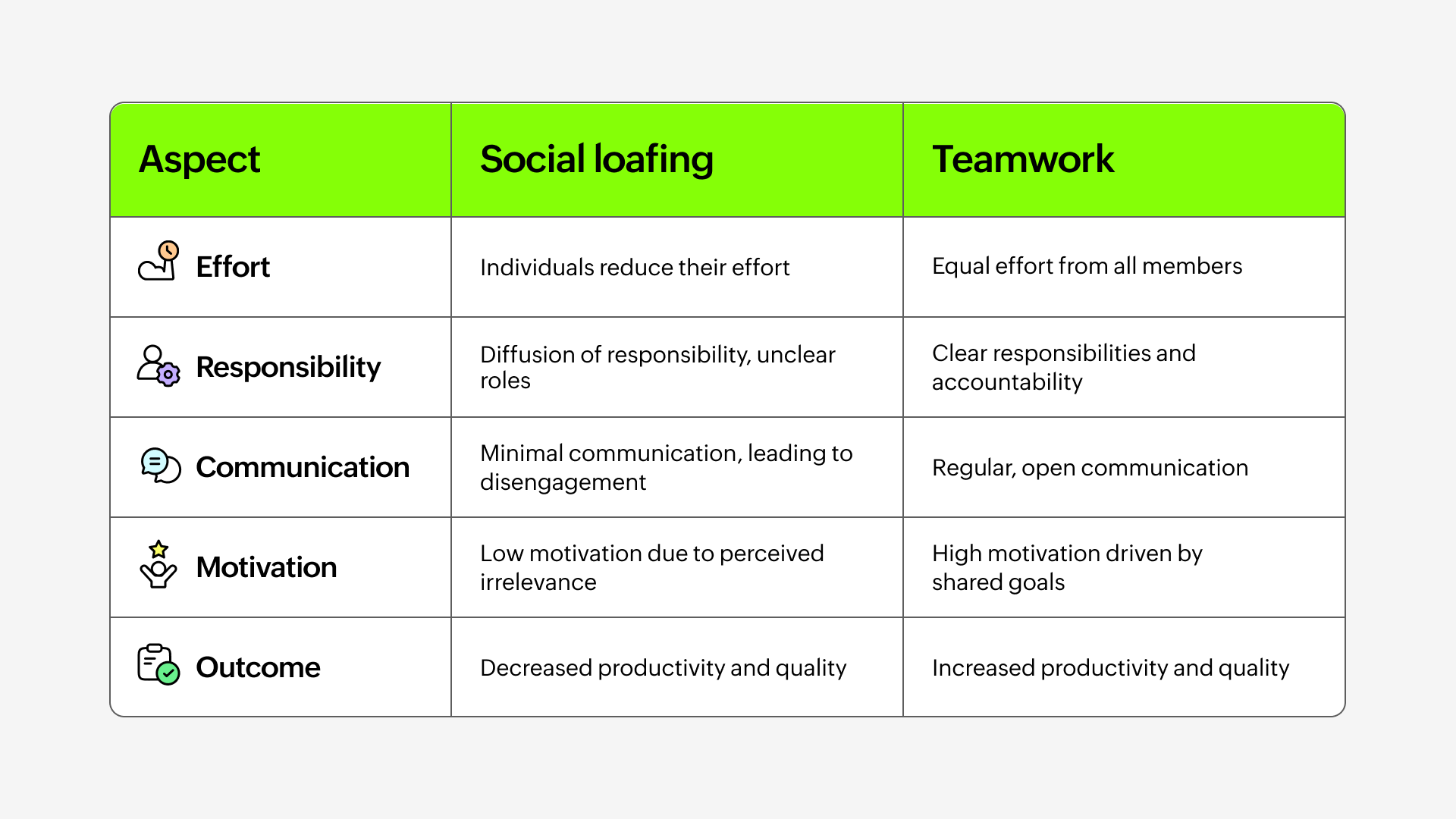- HOME
- All Products
- Collaboration
- Social loafing vs teamwork: How to foster effective collaboration in workspaces?
Social loafing vs teamwork: How to foster effective collaboration in workspaces?
- Published : October 31, 2024
- Last Updated : December 20, 2024
- 1.3K Views
- 5 Min Read
Working as a team makes things easier. You have more people to help you, fresh perspectives when brainstorming ideas, and the ability to work on complex tasks—all of which helps reduce the workload. However, when working on a group project, sometimes a few people do most of the work while others barely pitch in.
This situation is a classic example of social loafing, where people in a group contribute less than they would if they worked alone. Social loafing may hinder teamwork, resulting in inefficiency and dissatisfaction among team members. It reduces productivity in a workplace where collaboration is essential.
Therefore, it is crucial to find the balance between fostering teamwork and reducing social loafing to maintain productivity and team morale. In this article, we'll look into the factors that lead to social loafing and explore strategies to address it.
What is social loafing?
Social loafing refers to the situation where individuals contribute less in a group than they would alone. Larger groups tend to have a higher prevalence of this behavior as individuals feel less accountable and responsible for the outcome. This can impact the effectiveness of group projects and may lead to uneven work distribution.
Before we know how to overcome it, we need to understand what causes it.
Why does this happen?
In a modern workplace, social loafing is more complex than we think and often goes unnoticed. The major factors for social loafing are:
Diffusion of responsibility
In larger group setups, individuals feel less accountable for the outcome since the focus is on group performance and not individual performance.
No clear roles
When individuals don't have clear roles and don't understand how their job impacts the organization, they don't feel responsible for their work.
Lack of recognition
A lack of credit for individual contributions can lead to disengagement.
Task perception
If the task feels unimportant or repetitive, people are less likely to put in effort.
The negative impact of social loafing on teamwork
When social loafing takes place, it disrupts the delicate balance of teamwork. Some of the key issues teams face are:
Reduced morale
Team members who constantly pull more weight become resentful, resulting in frustration and detachment.
Low productivity
If some members in the team under-perform, others have to compensate for the loss, slowing down the whole process.
Loss of creativity
In teams where social loafing happens, creativity and innovation suffer since only a few people actively engage in brainstorming or problem-solving.
How to avoid social loafing and move toward effective teamwork
To shift from social loafing to effective teamwork, it's important to create a culture where every team member feels valued, held accountable, and motivated. Here are some effective strategies to promote effective teamwork along with some real-life examples.
Set up clear goals and expectations
Set up clear, measurable goals with individual responsibilities. When each member understands their expectations, it becomes difficult for anyone to slack off. Setting deadlines for specific goals fosters accountability.
To minimize social loafing, a marketing team lead working on a product launch might set a well-defined goal for the team, such as increasing social media engagement by 10 percent in the next month. Next, they'd assign specific tasks to each member, such as content creation, design generation, analytics tracking, and advertisement campaign management, with clear deadlines. This way, every team member understands their responsibilities and how they contribute to the overall goal.
Assign specific roles
Dividing the work into specific roles and assigning one to each member reduces work overlap, ensuring that no one can blend into the background. Customize roles to match individuals' abilities to make them feel that their work is essential to the team’s success.
For instance, consider a software development team building an app for a client. The project involves various roles, including design, front-end development, back-end development, quality testing, and more. Assigning roles tailored to individuals' skills is essential to the app's success; the person with the strongest UI/UX design expertise should focus on the user interface instead of back-end development. This ensures that all team members feel their contributions are vital to the app's success and minimizes the chances of anyone feeling marginalized or overlooked.
Encourage open communication
Fostering a culture of open communication helps to avoid misunderstandings and disengagement. Regular check-ins and feedback sessions keep everyone informed and involved with the work's progress.
For example, hybrid teams can make use of collaborative tools such as Zoho Cliq or Zoho Meeting to hold regular calls, check on progress, discuss any challenges, and offer suggestions. These regular check-ins keep everyone engaged and informed and help prevent misunderstandings.
Foster a sense of ownership
Encourage team members to take ownership of their roles by giving them control over how they complete tasks. Individuals who feel personally responsible for their work are less inclined to loaf.
Team managers can allocate tasks to team members and allow them to choose how they approach their work items. Each team member may prefer different tools to do the same work. When people are given the freedom to make decisions about their work, they feel more responsible for the outcome.
Recognize individual contributions
To maintain motivation among team members, recognize and reward individual contributions on a regular basis. Celebrating small wins within the group ensures that everyone feels valued for their contributions, reducing the desire to loaf.
In meetings, managers can acknowledge individual contributions by giving monthly shout-outs. After the project is completed, they could send an email to the entire company recognizing each member's specific contribution to the project's success. These activities boost team morale and ensure that everyone feels valued for their efforts.
Limit group size
Social loafing tends to increase in larger groups, where it's easier for individuals to hide their lack of contribution. Keeping group sizes small and manageable allows for more direct interaction and accountability.
Dividing teams into groups of four to five members and assigning specific work responsibilities to each group enables more focused discussions, better individual contributions, and higher accountability because each person has a clear role and responsibility. Managers can also easily track individual efforts and provide feedback directly to each group.
Wrapping up
Balancing social loafing and teamwork is all about creating a culture in which everyone feels valued.
Remember, teamwork is about collaborating and connecting, not competing. When everyone works together and feels accountable, productivity increases! Embracing individual strengths while also enjoying collective wins ensures a happy, productive team—and that is what truly drives success.
 Revathi Selvaraj
Revathi SelvarajRevathi is a product marketer at Zoho Workplace. She writes about topics related to workplace collaboration, productivity, and personal development. Outside of work, she enjoys painting, cooking, and occasionally laughing at her own jokes, all while embracing the present moment.


